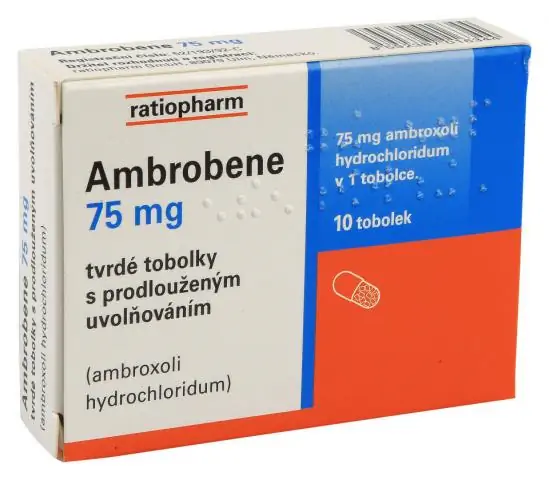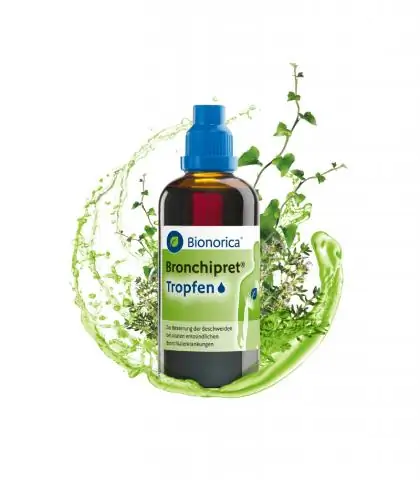- Author Rachel Wainwright [email protected].
- Public 2023-12-15 07:39.
- Last modified 2025-11-02 20:14.
Bronchicum C
Latin name: Bronchicum C
ATX code: R05CA10
Active ingredient: Thyme (Thymus)
Manufacturer: A. Nattermann, Germany
Description and photo update: 19.10.2018
Prices in pharmacies: from 171 rubles.
Buy

Bronchicum C is a herbal medicine for the symptomatic treatment of inflammation of the upper respiratory tract with antimicrobial and expectorant effects; effective at any stage of the development of cough, including with difficult sputum.
Release form and composition
Bronchicum C is available in the following dosage forms:
- pastilles: slightly biconvex, round, cream-colored, small inclusions are allowed (10 pcs. in blisters, 2 blisters in a cardboard box);
- syrup: transparent or slightly opalescent reddish-brown liquid, sediment formation is allowed (100 ml in glass bottles, in a cardboard box 1 bottle complete with a dispenser cup; 5 ml in mini-bags, in a cardboard box 8 or 20 mini- packages).
Composition of 1 lozenge:
- active substance: liquid extract of thyme herb * - 100 mg;
- auxiliary ingredients: acacia gum, cineole, levomenthol, stearic acid, sucrose, colloidal silicon dioxide, povidone, magnesium stearate.
Composition of 1 ml (1.26 g) syrup:
- active substance: liquid extract of thyme herb * - 150 mg;
- auxiliary ingredients: concentrated cherry juice, honey flavor, rose oil, sodium benzoate, liquid dextrose (glucose), invert syrup 74/95, citric acid monohydrate, sucrose solution 67%, purified water.
* The active ingredient contains: thyme herb (thyme) and extractant [ammonia solution 10%, glycerin 85%, ethyl alcohol 90% (v / v), water - in a ratio of 1: 20: 70: 109].
The ratio of thyme herb to the extractant is 1: 2-2.5.
Pharmacological properties
Pharmacodynamics
Lozenges have an expectorant and mucolytic effect.
The syrup has an expectorant, anti-inflammatory, bronchodilator, antimicrobial effect, reduces the viscosity of sputum and helps to accelerate its evacuation.
Indications for use
Bronchicum C is recommended for use in inflammation of the upper respiratory tract, accompanied by a cough with difficult sputum: lozenges - for symptomatic therapy, syrup - as part of complex treatment as an expectorant.
Contraindications
According to the instructions, Bronchicum C is contraindicated for the following diseases / conditions:
- chronic heart failure (CHF) in the stage of decompensation;
- severe renal / hepatic impairment;
- pregnancy and lactation (breastfeeding);
- children's age: syrup - up to six months, lozenges - up to 6 years;
- individual hypersensitivity to any component of the drug.
Since the syrup contains glucose, it is contraindicated to take it in case of glucose-galactose malabsorption, sucrase / isomaltase deficiency and congenital fructose intolerance.
Due to the presence of ethyl alcohol in the syrup, it cannot be taken by patients with alcoholism, and for liver diseases, diseases and brain injuries, epilepsy, the syrup is used with caution only after consulting a doctor.
Instructions for the use of Bronchicum C: method and dosage
Bronchicum C pastilles are used by absorption in the oral cavity until complete dissolution.
Recommended dosage: children 6-12 years old - 1 pc. 3 times a day; children over 12 years old and adults - 1-2 pcs. up to 3 times a day.
Syrup Bronchicum C is taken orally, after a meal, during the day, at regular intervals.
Recommended dosage depending on age (in the absence of other doctor's prescriptions):
- children from six months to 1 year: 2.5 ml (½ teaspoon) 2 times a day;
- children 1-2 years: 2.5 ml (½ teaspoon) 3 times a day;
- children 2-6 years old: 5 ml (1 teaspoon / 1 mini-packet) 2 times a day;
- children 6-12 years old: 5 ml (1 teaspoon / 1 mini-packet) 3 times a day;
- adolescents over 12 years old and adults: 10 ml (2 teaspoons / 2 mini-bags) 3 times a day.
The syrup contains plant components that can form a sediment. Before using it, shake the bottle and knead the mini-bag between your fingers.
The duration of the therapeutic course is determined by the duration of the disease and the severity of its symptoms.
Side effects
The use of Bronchicum C in rare cases can cause the following allergic reactions: urticaria, skin rash, Quincke's edema (pronounced angioedema of the mucous epithelium, skin and subcutaneous tissue of the oral cavity and pharynx).
When taking syrup from the gastrointestinal tract, it is possible to develop nausea, dyspepsia, gastritis.
In such cases, as well as in the event of any other unwanted side effects, the drug should be discontinued and a doctor should be consulted.
Overdose
There is no data.
special instructions
The lack of improvement in the condition when using lozenges for 5 days of therapy indicates the need to contact the attending physician for advice.
Immediate referral to a specialist is necessary when taking the syrup, if there is no improvement in the condition, attacks of suffocation, purulent discharge appear, and the body temperature also rises.
Information for patients with diabetes mellitus and persons on a hypocaloric diet about the amount of carbohydrates, expressed in XE (bread units), depending on the form of release of the drug:
- mini-bag / teaspoon (5 ml syrup) - 0.3;
- lozenge - 0.07.
The ethyl alcohol content of Bronchicum C cough syrup is 4.9% by volume.
The amount of absolute ethyl alcohol in milligrams contained in the maximum single / daily doses of the drug, depending on the age dosage regimen:
- adolescents over 12 years old and adults: 10 ml (<386.7 mg) / 30 ml (<1160.1 mg);
- children 6-12 years: 5 ml (<193.4 mg) / 15 ml (<580.1 mg);
- children 2-6 years old: 5 ml (<193.4 mg) / 10 ml (<386.7 mg);
- children 1-2 years: 2.5 ml (<96.7 mg) / 7.5 ml (<290 mg);
- children from six months to 1 year: 2.5 ml (<96.7 mg) / 5 ml (<193.4 mg).
Influence on the ability to drive vehicles and complex mechanisms
During the period of taking Bronchicum C syrup, caution is required when performing potentially dangerous types of work that require increased concentration of attention and high speed of psychomotor reactions (including driving and working with moving mechanisms).
Application during pregnancy and lactation
Bronchicum C is contraindicated for pregnant and lactating women.
Pediatric use
In pediatric practice, the drug is used according to indications: syrup - in children over six months, lozenges - in children over 6 years old.
With impaired renal function
Bronchicum C should not be used for severe renal impairment.
For violations of liver function
Bronchicum C with severe liver dysfunction is prohibited.
Drug interactions
The simultaneous use of lozenges and syrup with antitussive drugs and drugs that inhibit the formation of sputum is not recommended due to the difficulty in coughing up the liquefied secretion.
Analogs
Analogs of Bronchicum C are: Bronchikum TP, Bronchipret TP, Tussamag, Bronchipret, Gerbion primrose syrup, Evkabal, Doctor Tys Bronchosept, Stopussin-phyto, Stomatofit, etc.
Terms and conditions of storage
Store at temperatures up to 25 ° C. Keep out of the reach of children.
Shelf life: syrup in bottles and pastilles - 3 years, syrup in mini-bags - 2 years.
After opening the bottle, the syrup is suitable for six months.
Terms of dispensing from pharmacies
Available without a prescription.
Reviews of Bronchicum C
Reviews about Bronchicum C are diametrically opposite: from positive, in which patients praise the drug for its effectiveness, good tolerance, natural composition, to negative, where it is stated that the drug does not help at all or is not suitable, causing side reactions. Its rather high cost was also noted.
Price for Bronchicum C in pharmacies
Estimated price for Bronchicum C: cough lozenges, 20 pcs. in the package - 215 rubles, cough syrup, 100 ml in a bottle - 320 rubles.
Bronchicum C: prices in online pharmacies
|
Drug name Price Pharmacy |
|
Bronchicum C lozenges 20 pcs. 171 r Buy |
|
Bronchicum with 100mg lozenge n20 205 RUB Buy |
|
Bronchicum C syrup 100 ml 1 pc. 288 r Buy |
|
Bronchicum C syrup 100ml 296 r Buy |

Maria Kulkes Medical journalist About the author
Education: First Moscow State Medical University named after I. M. Sechenov, specialty "General Medicine".
Information about the drug is generalized, provided for informational purposes only and does not replace the official instructions. Self-medication is hazardous to health!






